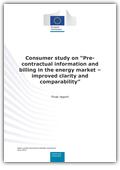Why behavioural insights matter
People make numerous decisions around energy consumption. For example, we choose whether to buy a fridge that uses more or less energy, or whether to switch to a green energy contract. In making these decisions, price is just one of the factors we consider, alongside many others (quite often subconsciously).
Behavioural insights can identify these factors and thus improve our understanding of what drives energy-related decisions. For instance
- We make numerous implicit decisions that consume energy, for instance turning on the lights or commuting by car. These involve daily routines and habits whose energy-use is invisible to us.
- We often don’t take the time to assess all the available information when we make energy-related decisions. For example, when choosing an energy contract, our attention is limited, and we rely on information that is simple and salient.
- We save more energy when learning that our neighbours’ use less energy.
- We’re more likely to choose a green energy contract when it's presented to us as the default option.
Understanding these and other behavioural factors contributes to better energy policy.
How behavioural insights can help
Behaviourally-informed energy policy takes note of the relevant factors. For instance
- Social norms and energy conservation
The EU’s energy efficiency directive requires energy bills to include a comparison with an average user. This review of non-price interventions on energy conservation finds that providing social information can significantly reduce consumption. - Energy labels
A 2014 behavioural study showed that consumers are more likely to choose the most energy efficient appliance when the energy label for electric appliances used a scale ranging from A to G rather than A+++ to D. In 2015, this evidence informed the Commission's proposal to return to the A to G label scale .
Ongoing projects
- Barriers to implementing EU green policies: a behavioural perspective
- Behavioural factors driving firms’ investment in energy efficiency
- Behavioural interventions to save energy in scientific laboratories
- Building a sustainability-driven mindset among European Commission staff
- Promoting efficient and eco-friendly electric vehicle charging
Selected publications

